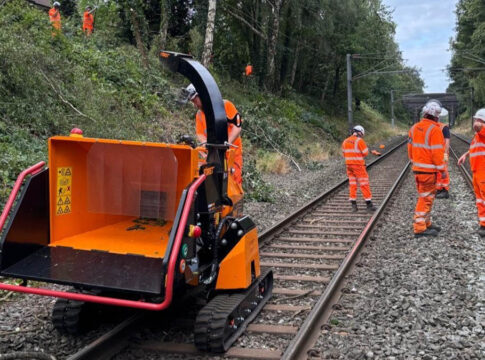Polish State Railways has launched its biggest ever tender, worth some 1.411 billion euros, for the modernisation of part of an international rail corridor that will connect Poland to the Baltic states. Set to be a key section of the Rail Baltica project, PKP PLK has also specified that the bid will only be open to companies from what are essentially Western or Western-backed countries. But why so cautious?
Last week, Poland’s national rail company PKP PLK announced a massive tender for upgrades to its line from Białystok, a major city near the eastern border with Belarus, to Ełk, a northern town situated in the Masurian Lake District. The 100 km of track forms part of the strategic north-south Rail Baltica corridor linking Poland with the Baltic states and further into Europe.
The reconstruction work specifies that the line should be upgraded to make it possible for trains to get from Białystok to Ełk in 55 minutes, travelling at a speed of up to 200 km/h, with construction works planned from 2029.
“The reconstruction of the Białystok – Ełk line is an investment that the inhabitants of the region have been waiting for for years,” said Poland’s Minister of Infrastructure Dariusz Klimczak on announcing the bid from Białystok. “Shorter travel times, better travel comfort and greater safety are specific benefits that will change the daily lives of travellers,” he added.
Poland keeping it in the Western fold
Piotr Wyborski, President of the Management Board of PKP Polskie Linie Kolejowe SA, added that the tender would also be exceptional for another reason: “For the first time, contractors based outside the EU, EEA and entities from countries that are not covered by the WTO government procurement agreement will be excluded from the procedure. This is our decision and reaction to the recently announced judgment of the Court of Justice of the European Union (CJEU).”
The judgment that Wyborski is referring to comes from October 2024, when the EU court ruled that companies from countries that don’t have agreements with the EU to allow fair access to each other’s public contracts can’t use EU laws to demand equal treatment when bidding for projects in the bloc. That means countries that are eligible include all EU nations; non-EU EEA members such as Norway and Iceland; and WTO GPA countries like the US, UK, Japan, Canada, and Australia. Therefore, it’s partly an economic move.
A NATO side project
However, as the EU has been increasingly vocal about reducing reliance on external powers for critical infrastructure, particularly amid growing tensions with countries like Russia and China, there’s a strong geopolitical angle here. Indeed, the Rail Baltica project is not only a major civilian infrastructure development; it’s also expressly part of the EU’s strategy to boost its military mobility in Europe.
As the CEO of Lithuania’s LTG Group, Egidijus Lazauskas, said earlier this year: “Rail Baltica is fundamental for faster military mobility and for the overall security of the region. We estimate that the number of NATO military trains arriving in Lithuania has increased every year since 2019, with a 40 per cent increase in 2023. The need for the infrastructure is high and mutual.”
To give an idea of how non-Western companies are being increasingly kept out of the European rail loop, a Turkish association of companies that back in 2023 offered to build the Rail Baltica route were excluded from the procurement on the recommendation of Latvia’s State Security Service. This is despite Türkiye being a NATO-member state (it still has big military contracts with Russia) and the consortium offering a cheaper price than competitors.
What is Poland demanding from the tender?
As for the specifics of Poland’s new tender, the planned works include 100 km of railway line, with a total of 8 stations and 10 stops. A second track will be built along the entire length of the line to boost capacity, while PKP PLK specifies that the line will have to be decked out with European Rail Traffic Management System (ERTMS) Level 2.
It adds that technical stations will need to be built in the region of Podlasie and the village of Lipińskie Małe. After the works are completed, the company says the supervision of the route to Ełk will be taken over by the Local Railway Traffic Control Centre in Białystok as part of the digital upgrade.
PKP PLK also states that the new platforms will need to be of the same standard as on the rebuilt Czyżew – Białystok line, another section of the Rail Baltica project. There will apparently be six stations and 10 stops for passengers along the track where the platforms will be adapted to the needs of people with limited mobility.
New stops, no level crossings
Two entirely new stops will be created along the line at Dziękonie, which will replace the Czechowizna stop, and Ciemnoszyje. Some of the stations will also move so that the railway is closer to residents – this will be the case at the Białystok Starosielce station and the Białystok Bacieczki, Fasty and Borsukówka stops.
The modernisation will also see the replacement of level crossings with safer, grade-separated junctions like tunnels and viaducts. This includes plans for 20 road viaducts, 12 railway viaducts, and 12 underpasses. These upgrades mean drivers won’t have to stop for passing trains, and trains will be able to travel at speeds of up to 200 km/h once the ETCS system is fully operational. Freight transport will also improve, with the upgraded line supporting freight trains travelling up to 120 km/h and reaching lengths of 750 metres.
EU funded, with more cash expected
The investment is part of several Rail Baltica projects, co-financed by the European Union’s Connecting Europe Facility (CEF). Specific projects include work on the Białystok–Knyszyn and Osowiec–Ełk sections, which have received EU funding, while the Knyszyn–Osowiec section is currently applying for additional EU support.
This article was orginially published on our sister publication RailTech.com
